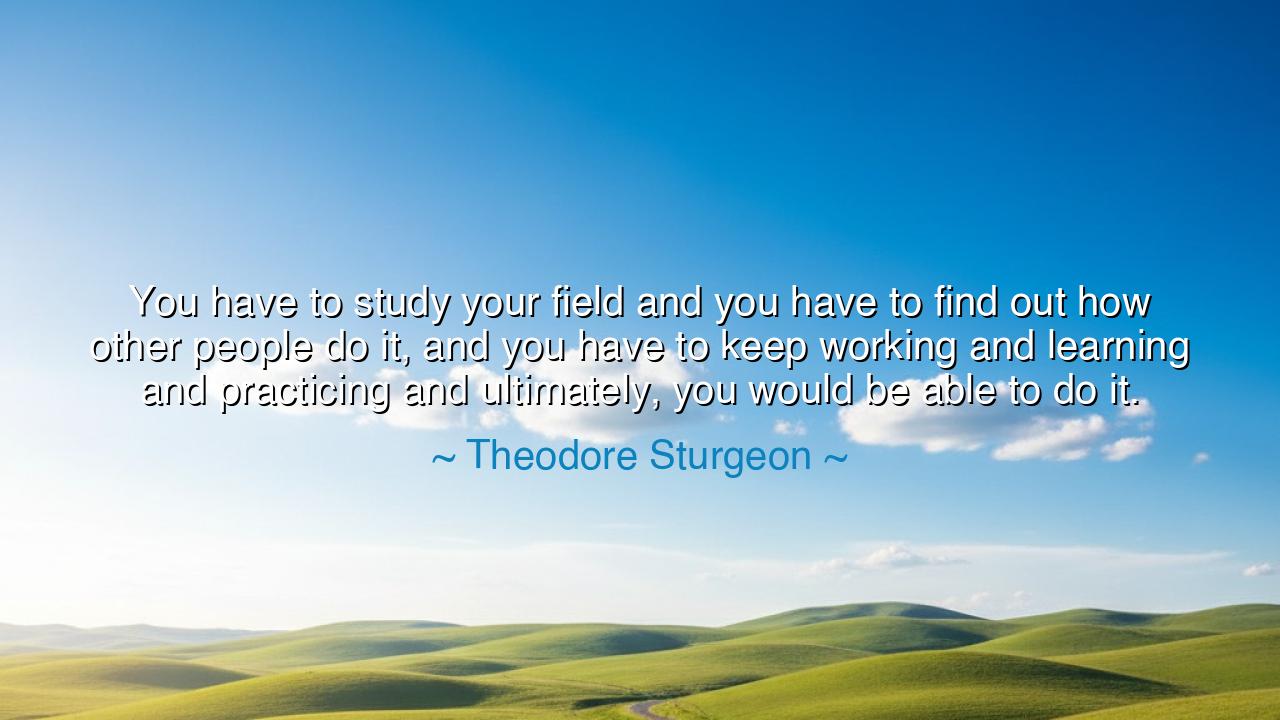
You have to study your field and you have to find out how other
You have to study your field and you have to find out how other people do it, and you have to keep working and learning and practicing and ultimately, you would be able to do it.






Theodore Sturgeon once declared with steady conviction: “You have to study your field and you have to find out how other people do it, and you have to keep working and learning and practicing and ultimately, you would be able to do it.” These words, though simply spoken, carry the weight of timeless wisdom. They remind us that mastery does not fall like rain from the heavens, but must be dug from the earth with patient hands. They echo the ancient truth: that greatness is earned, not given, and that the road to skill is paved with discipline, humility, and perseverance.
To study is the first step, for no craft grows in ignorance. The apprentice of old sat at the feet of the master, listening to every word, observing every motion. In the guild halls of the Middle Ages, in the academies of Greece, in the workshops of the Renaissance, knowledge was passed down not as idle entertainment, but as sacred inheritance. Sturgeon’s words remind us that no matter the field, whether it be art, science, music, or craft, we must begin by learning what has come before. To ignore the wisdom of others is to walk blind on a dangerous road.
But study alone is not enough. One must also “find out how other people do it.” Here is humility: the recognition that others carry knowledge we do not yet possess. Too often pride whispers that we can carve our own path without guidance, but Sturgeon reminds us that learning from others is no shame. Indeed, it is the foundation of wisdom. Just as Alexander learned from Aristotle, just as Mozart studied the works of Haydn, just as countless warriors learned from their elders, so too must we seek models, examples, and teachers to sharpen our craft.
Yet even this is not enough, for knowledge without toil is hollow. Sturgeon’s wisdom declares: “you have to keep working and learning and practicing.” This is the crucible of growth. Consider Thomas Edison, who tested thousands of filaments before the light bulb shone steady. He did not succeed by brilliance alone, but by relentless practice and the refusal to surrender to failure. Or consider the swordsman Musashi, who after countless duels and endless hours of training, transformed technique into instinct. The lesson is clear: to practice is to plant seeds, to water them with labor, and to harvest them in time.
The word “ultimately” carries its own weight. It is a word of patience, of time, of long journeys. Sturgeon promises not sudden mastery, but the reward of persistence: “ultimately, you would be able to do it.” This is the wisdom of the farmer who sows in spring and waits for autumn, the sailor who trusts the stars through storm and calm alike. Mastery does not arrive in a single dawn but grows slowly, silently, until one day the apprentice looks back and finds he has become the master.
Let us then take the story of Michelangelo, who spent years studying the anatomy of the human body, dissecting corpses in secret, sketching endlessly. His genius was not a spark alone but a fire fed by countless hours of study, observation, and practice. When at last he carved David, he declared he merely revealed what was already in the stone. Yet it was his years of discipline that gave him the eyes to see what others could not. His life embodies Sturgeon’s teaching: through study, through learning, through relentless practice, the impossible becomes possible.
What then is the lesson for us? It is simple yet profound: if you wish to achieve, you must walk the path step by step. First, study your craft with reverence. Second, seek out others who have walked the road before you, and learn from their triumphs and their mistakes. Third, practice without ceasing, knowing that each repetition strengthens the hand and sharpens the mind. And finally, be patient, for mastery comes not in haste but in perseverance.
So I say to you: heed the words of Theodore Sturgeon. Whatever your field, do not falter, do not grow weary. Learn, practice, and remain humble. In time, your efforts will bear fruit, and you will rise not as a dreamer of possibilities but as a maker of realities. For the ancients knew, and Sturgeon reminds us: the secret of mastery lies not in talent alone, but in the unyielding will to keep going, to keep learning, until the work of your hands and the strength of your spirit become one.






AAdministratorAdministrator
Welcome, honored guests. Please leave a comment, we will respond soon